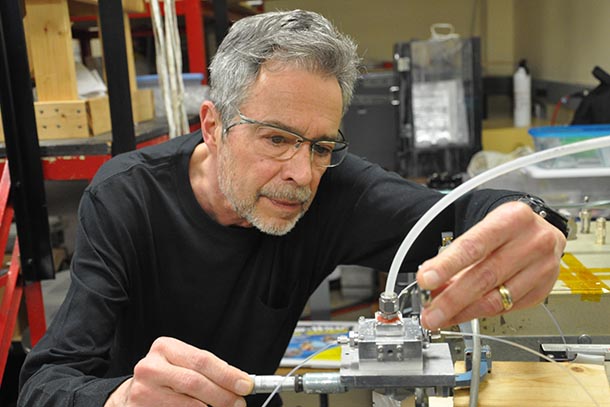
Michael Micci, professor of aerospace engineering, died on Monday, Sept. 21, after an eight-month battle with cancer. IMAGE: SVEN BILÉN
Engineering mourns death of aerospace engineering's Michael Micci
10/8/2020
By Samantha Chavanic
UNIVERSITY PARK, Pa. — Faculty, staff and students in the Penn State College of Engineering are mourning the loss of Michael Micci, professor of aerospace engineering, who died on Sept. 21, in State College after an eight-month battle with cancer. Micci was 66 years old.
Raised in Joliet, Illinois, Micci attended high school at the Joliet Catholic Academy. Growing up in the 1960s, the heyday of the space race, he was inspired by the United States’ space program and science fiction writers like Arthur C. Clarke. This inspiration matured into a passion — advancing from winning gold medals in national and international model rocket competitions to building a 40-year career centered around spaceflight.
Micci earned his bachelor of science and master of science in aerospace engineering from the University of Illinois at Urbana–Champaign. He completed his doctoral degree in the Department of Mechanical and Aerospace Engineering at Princeton University, with a focus on rocket propulsion. His dissertation, “Solid propellant response functions deduced from forced longitudinal waves in solid rocket motors,” focused on the experimental characterization of unsteady solid propellant rocket combustion.
Upon completion of his doctorate, Micci joined Penn State’s Department of Aerospace Engineering in 1981 as an assistant professor. In 1988, Micci was promoted to associate professor and in 1998 he received full professor rank. During his tenure with the department, Micci taught aerospace topics ranging from dynamics and control to programming to spacecraft environments. As a genuine rocket scientist, Micci specialized in all forms of rocket propulsion. His research and teaching experience also expanded outside of the University, with sabbaticals spent as a visiting scientist at the Air Force Office of Scientific Research in Washington, D.C.; a research scientist at the Office Nationale d’Études et de Recherches Aérospatiales in Paris, France; a Nuclear Regulatory Commission (NRC) senior research associate at the Air Force Research Laboratory at Edwards Air Force Base in California; a visiting professor at the University of London, Queen Mary; and a NRC senior research associate at the Air Force Research Laboratory in Maui, Hawaii.
Micci’s specialty in propulsion led him to begin researching microwave electrothermal thrusters (MET) for satellites in 1985. These thrusters can use an inexpensive and clean propellant: water. In 2019, Micci’s career-spanning MET work, supported through the years with funding from the Air Force Office of Scientific Research; NASA; the Defense Advanced Research Projects Agency; DynaCon and Northrop Grumman, culminated with a successful test flight of an MET by Momentus Space. The test flight demonstrated that water vapor plasmas can inexpensively maneuver orbiting satellites.
“It has been my distinct privilege to work closely with Mike over the past two decades as we’ve delivered innovations to the field of space propulsion,” said Sven Bilén, head of the School of Engineering Design, Technology, and Professional Programs and professor of engineering design, electrical engineering and aerospace engineering. “Our collaboration is a great example of the value of interdisciplinary research. I know Mike was particularly honored to see his career-long effort on the MET culminate in a flight validation mission last summer. I also really appreciate his mentorship and guidance from my days as an assistant professor to now. I am focused on building upon his legacy of innovations to space propulsion.”
In 1994, Micci was the first person to use molecular dynamics to simulate supercritical atomization and vaporization as it occurs in high performance liquid rocket engines. Described by a current student as someone for whom “the learning never stops,” Micci taught himself quantum computing, a new type of computing that uses quantum mechanics to solve large, difficult problems. His interests expanded outside of the hard sciences as he also enjoyed politics, live theater, international travel and sailing.
“He was the first person to describe to me the potential for quantum computing to solve large, difficult solutions such as the Navier-Stokes equations describing the flow of air around a wing — his eyes lit up with joy as he described how the different quantum states could all hold simultaneously all possible solutions,” said Amy Pritchett, professor and department head of aerospace engineering.
Micci was preceded in death by his mother, Bernadine, and his father, Americo. He is survived by his wife of 19 years, Catherine Cohan, research associate in the College of Engineering’s Center for Outreach and Inclusion; their two children, Sofia and Carmen; and his sister, Gina.
Micci also leaves behind an academic family of colleagues and students from around the world. Throughout his career, Micci collaborated with numerous aerospace experts on research projects and journal articles and served as a professor to more than 3,000 undergraduate students and as an adviser to more than 40 master’s and 14 doctoral students.
“Dr. Micci has had a long and distinguished career with us,” Pritchett said. “Going through his personnel records, I found his original interview agenda from more than 40 years ago with handwritten notes by Barney McCormick and other luminaries praising his interview and hire. He has served throughout his career with great interest and regard for students, including a long stint as our graduate program coordinator. I especially recall his deep joy and curiosity regarding his research. Our thoughts and prayers are with Cathy and his family.”
A celebration of Micci’s life and work will be scheduled when it is possible to safely gather in person. To honor his legacy as a mentor and researcher, two endowed funds have been established to support Department of Aerospace Engineering students. The Michael Micci Student Research Fund will support undergraduate and graduate space research activities and the Michael Micci Graduate Student Award will provide financial support for graduate students pursuing space propulsion.



